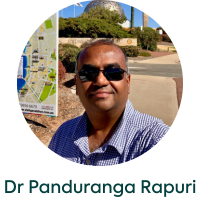For many doctors, the decision to practice in a different country is driven by a desire for new opportunities, better work-life balance or advanced training. However, this transition is rarely straightforward, presenting numerous challenges and rewards along the way.
 Dr Panduranga Rapuri is an overseas-trained psychiatrist whose career path has taken him from studying medicine in India, to completing his specialist training in the UK and working in regional Australia today. His experiences provide valuable insights for other doctors contemplating a similar move to Australia.
Dr Panduranga Rapuri is an overseas-trained psychiatrist whose career path has taken him from studying medicine in India, to completing his specialist training in the UK and working in regional Australia today. His experiences provide valuable insights for other doctors contemplating a similar move to Australia.
Pursuing psychiatry: from India to the UK
Dr Rapuri’s interest in mental health began during his medical studies in India. He realised that there were less opportunities in the field in India compared to other specialties. “There are about three major institutes that specialise in psychiatry, but otherwise, it’s not as developed,” Dr Rapuri explains. This realisation motivated him to pursue his specialist training in the UK, a country known for its advanced psychiatric practices and education opportunities. “I thought the UK is a good place to do it (psychiatry training),” he recalls, “because that’s where the beginnings of psychiatry happened.”
Migration challenges and highlights
Dr Rapuri’s journey took him from India to the UK, then to New Zealand and finally Australia. Each move came with its own set of challenges, primarily the process of medical qualification approval by different medical boards.
“Every medical board wants to certify and verify (your qualifications) for themselves, even if the board that certified you before is perceived to be of ‘higher standard’,” he shares. This process often involved repetitive tests, such as the English language proficiency test, which he found particularly frustrating given his extensive experience in English-speaking countries.
However, despite these challenges, a key highlight was having the opportunity to understand different, diverse healthcare systems while integrating into various communities. “Moving to a new country is always a blend of excitement and uncertainty, he reflects. “Each transition taught me resilience and adaptability.”
Working in regional Australia
 Since 2021, Dr Rapuri has worked in Geraldton, a coastal regional town in Western Australia. He found the difference between metropolitan and regional areas to be more pronounced than he originally expected. “Visting people’s homes, seeing how the system can be backwards and realising that many regional healthcare systems are underdeveloped was quite a shock,” he recalls. “It’s almost like visiting a different country within a country”.
Since 2021, Dr Rapuri has worked in Geraldton, a coastal regional town in Western Australia. He found the difference between metropolitan and regional areas to be more pronounced than he originally expected. “Visting people’s homes, seeing how the system can be backwards and realising that many regional healthcare systems are underdeveloped was quite a shock,” he recalls. “It’s almost like visiting a different country within a country”.
Despite this, he finds that there are many rewarding aspects about working regionally, such as shorter commute time, smaller collaborative teams and a strong sense of community. “It takes hardly 5-10 minutes from home to work, and I find that the smaller teams are always more cohesive than in metropolitan areas,” he points out. Moreover, he finds that the ability to make a tangible difference in the community is immensely fulfilling. “You feel like you are truly needed and can see the impact of your work directly in regional towns.”
Moving to Perth
Currently, Dr Rapuri is looking to attain permanent residency and hopes to relocate to Perth. The process, while challenging, has been made much smoother with the professional help of Wavelength’s registered migration agents. “In all the places I’ve worked, I’ve done it myself. I didn’t need professional help because I found things to be more straightforward,” he explains.
“But because there’s so much bureaucracy in Australia’s processes, I needed professional help as I actually got it wrong the first time. Leiara (Wavelength’s in-house Migration Agent) and her assistance has been invaluable,” he expresses. “When the hospital I was working at had to renew my one-year visa, there was a lot of struggle and ‘dilly-dallying’. I said to ask Leiara, and when they did, I had it renewed within a week.”
For Dr Rapuri, his plan to relocate is more than just a career change. “Moving to Perth will mean easier access to cultural and social resources that are important to me,” he says.
“The tricky thing about being a first-generation immigrant is that you are literally caught in two worlds – the country you come from, and where you want to immigrate to and integrate with the society,” he explains. “But then there’s part of you that kind of wants to say, ‘I belong somewhere, I belong with certain ideologies.”
Larger cities like Perth offer more opportunities for immigrants to connect to their cultural identities. “There’s no temple in Geraldton, and that’s something I miss,” he shares. “There also only two arm-length shelves of Indian food at the grocer, so moving to Perth will allow me to reconnect with my cultural roots.”
Advice for overseas-trained doctors
Dr Rapuri emphasises the importance of clarity and purpose for those considering a move to Australia. “Always remember your actual purpose for migrating,” he advises. The process can be lengthy and demotivating, taking up to two years to complete. He encourages prospective migrants to weigh lifestyle considerations and other factors carefully. For him, a warmer climate with less rain was a significant motivator for moving from the UK to Australia. “You can change a lot of things, but you can’t change the weather,” he jests.
“There will be disheartening factors, but keeping sight of your primary aim is crucial,” he adds. “The key is to stay focused on why you chose Australia in the first place and let that guide you through the tougher times.”
Dr Rapuri also suggests seeking professional help with the migration process. “For someone who is migrating, I always recommend Wavelength,” he says. “There’s a lot of paperwork, but with good and clear directions about what to do next, they’ve made it so easy.”
The journey of migrating and working in a new country is a significant undertaking for any medical professional. Dr Rapuri’s experiences highlight both the challenges and rewards that come with such a transition. From navigating regulatory hurdles to finding professional fulfillment, his story offers valuable lessons and encouragement for other internationally –trained doctors considering a move to Australia.
Ready to start your next career chapter in Australia or need help navigating the journey to permanent residency? Contact our Regulatory and Migration team today.

